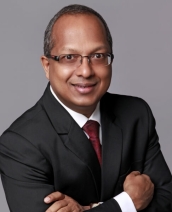Thomas Kuruvilla
Managing Partner
Board of directors
Head of Arthur D. Little Middle East & India
Thomas has a proven track record of creating value as a trusted advisor to telecom players, public sector organizations and family conglomerates on growth strategy, organization transformation & national regulations management.

Areas of Focus
Education
Past Experience

Thomas is Managing Partner of Arthur D. Little Middle East & India as well as a member of the Board of Directors. He serves telecom operators, ministries and other public organizations, and family conglomerates.
Since joining Arthur D. Little in 1998, Thomas has been actively involved in complex strategy development, organization design and transformation projects across the Middle East and South East Asia to deliver significant and tangible impact – not just for his clients but also at a wider, national level.
His passion and commitment for providing the best value on all his projects acts as a key guiding principle for the entire office.
Prior to joining Arthur D. Little, Thomas worked at Larsen & Toubro as an Industrial Automation Engineer. He was also selected as a Pilot Officer with the Indian Air Force.
In addition to consulting, Thomas regularly teaches various management courses (International Business Strategy, Family Conglomerate strategy & Strategy Consulting) at different MBA schools across the globe.
Outside work, Thomas spends time on natural (not organic) farming and Ayurvedic plants.

Web3 & Metaverse — The rise of the new Internet & the India opportunity


INDIA: Surmounting the economic challenges of COVID-19

With the Internet of Things (IoT) every- where, can regulation be far behind?

Samena Trends

Diversification in the Era of Convergence

The OTT conundrum for MENA telecoms

Feed the Lion

Urban mobility – Learnings from the Middle East

Thomas is Managing Partner of Arthur D. Little Middle East & India as well as a member of the Board of Directors. He serves telecom operators, ministries and other public organizations, and family conglomerates.
Since joining Arthur D. Little in 1998, Thomas has been actively involved in complex strategy development, organization design and transformation projects across the Middle East and South East Asia to deliver significant and tangible impact – not just for his clients but also at a wider, national level.
His passion and commitment for providing the best value on all his projects acts as a key guiding principle for the entire office.
Prior to joining Arthur D. Little, Thomas worked at Larsen & Toubro as an Industrial Automation Engineer. He was also selected as a Pilot Officer with the Indian Air Force.
In addition to consulting, Thomas regularly teaches various management courses (International Business Strategy, Family Conglomerate strategy & Strategy Consulting) at different MBA schools across the globe.
Outside work, Thomas spends time on natural (not organic) farming and Ayurvedic plants.

Web3 & Metaverse — The rise of the new Internet & the India opportunity


INDIA: Surmounting the economic challenges of COVID-19

With the Internet of Things (IoT) every- where, can regulation be far behind?

Samena Trends

Diversification in the Era of Convergence

The OTT conundrum for MENA telecoms

Feed the Lion

Urban mobility – Learnings from the Middle East
More About Thomas
- Melbourne Business School (Australia)MBA Strategy & Finance
- Asian Institute of Management (Philippines)MBA Strategy & Finance
- Kerala University, TKM College of Engineering (India)Bachelor’s Degree in Electrical and Electronics Engineering
- Larsen & Toubro (1990–1995)Customer Services, Control and Automation Division
- Indian Air Force (1990)Selected as a Pilot Officer
